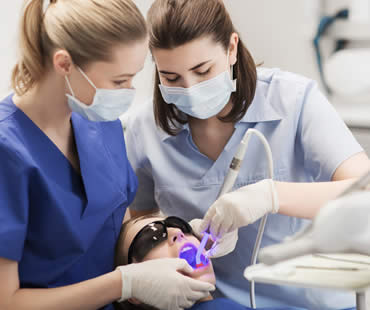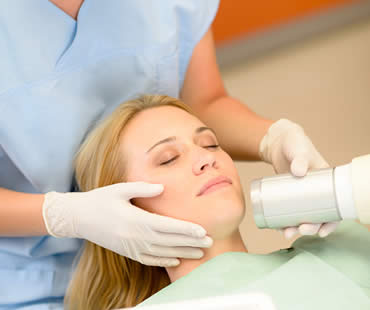
Severe dental phobia can cause people to completely avoid dental examinations and treatments. Anxiety about dental treatment can develop for many reasons, including fear of pain, the feeling of not having control, fear of needles, a strong gag reflex, or a history of bad dental experiences. If you suffer from extreme dental fears causing you to neglect necessary oral care, sedation dentistry may be the answer to your problem.
A trained sedation dentist can offer a variety of options to address your situation:
- Minimal sedation in the form of nitrous oxide allows you to be awake but relaxed during dental treatment and may be a good option for cleanings, routine examinations, or minor procedures. Your dentist is able to control the amount of sedation you receive.
- Oral conscious sedation also allows you to remain awake during procedures, but may cause you to feel drowsy and will keep you from having much memory of the treatment. A stronger dose can be given to produce more moderate sedation, in which case you may fall asleep but can easily be awakened.
- IV sedation is when a sedative drug is administered through a vein. This type of sedation works rapidly and also allows your dental professional to adjust the level of sedation during treatment.
- General anesthesia provides deep sedation through medications administered that cause nearly complete or total unconsciousness. With general anesthesia you cannot be awakened until the effects of the drugs have dissipated.
Sedation dentistry can be used for any type of dental procedure, from routine cleanings to more complicated, invasive procedures. Thanks to advances in sedation dentistry, you no longer have to fear the dentist and avoid necessary oral health care.
Do you live in Toronto or the surrounding area? Our team is ready to help you achieve your smile goals. Schedule your appointment today.

In order to ensure your comfort and ease during a dental procedure, sedation dentistry is often the best option. Many levels are available, including conscious oral sedation, inhaled sedation, and intravenous (IV) sedation.
Conscious oral sedation minimizes patient anxiety while allowing the patient to remain partially alert. Oral sedatives are used to accomplish minimal to moderate sedation. They come in the form of a pill, and are often taken within an hour of your dental procedure. Some dentists recommend a mild oral sedative the night before an appointment to ease anxiety and ensure a good night’s rest.
Depending on the dosage and on the individual recipient, an oral sedative can sometimes cause the patient to “doze off,” but the patient will never be fully unconscious and will awaken with a gentle shake. Even though you are never fully asleep during conscious oral sedation dentistry, you may not drive yourself home because you will not be fully alert.
Inhaled sedation utilizes nitrous oxide, also known as “laughing gas.” This gas is inhaled through a mask while your dentist controls the amount you receive. This type of sedation allows a patient to relax and to be fully comfortable, but to still be responsive. Nitrous oxide sedation has a tendency to wear off quickly. Because of this, you may be able to drive yourself home after your procedure.
IV sedation (sometimes known as “sleep dentistry”) provides the deepest, most relaxed sedation during dental procedures. Despite the name, IV/sleep sedation does not cause you to completely lose consciousness. Because the drugs used naturally produce a full or partial memory loss while active in your system, you may not remember anything that happened during your procedure. IV sedation is the fastest of the sedation dentistry methods. The amount of sedation is controlled by your dentist. You should not drive after IV sedation, as you may not be fully alert for a period of time.
Talk to your dentist about which sedation is right for you to ensure your dental procedure goes well and that you are comfortable throughout treatment.
Take the first step towards a confident smile. Contact our Toronto dental office to schedule your consultation!

If you are either planning to undergo cosmetic dental procedures or necessary treatments for dental problems, there is a case to be made for considering sedation dentistry. Sedation dentistry refers to the use of medications in varying forms to calm and relax you prior to and during a dental procedure. Just a few reasons to consider dental sedation include:
- Dental sedation can be used for essentially all regular dental procedures. Under sedation, your dentist can accomplish far more in one appointment, meaning less overall time for you in the dental chair. Procedures that may normally take 2 or 3 visits to the dentist can be completed all in one visit with the help of dental sedation.
- Normally, dentists do not like to work on both sides of the mouth at the same time as this requires anesthesia to each side and could cause the patient to bite their tongue. Sedation dentistry allows your dentist to work on both sides of the mouth in one sitting.
- Dental sedation allows you to feel relaxed and free from stress while the actual procedure is being performed. In many cases, even though you are still conscious, you will not remember any of the actual time you spent in the dentist chair.
With sedation dentistry, there is no need to dread dental treatments and procedures. Your fears and anxiety should not deter you from seeking the cosmetic or restorative dental care that you desire. Consult with your dental professional about the options offered for sedation, and schedule your oral care with the confidence that you will have a calm and pleasant experience while improving your smile.
Take the first step towards optimal oral hygiene. Reserve your dental appointment at our Toronto dental office now and experience personalized care.

One extremely common fear shared by many people is a fear of the dentist. Patients who possess this fear are often anxious and nervous about the sights, sounds and smells of a dentist’s office. Just imagining a routine visit can leave someone shaken and fearful, unable to sleep the nights prior to treatment.
Patients who share this common fear can put off necessary dental work. A fear of pain or needles can lead a patient to tolerate tooth pain or signs of infection in the mouth. If this sounds like you, talk to your dentist about sedation dentistry options.
Many people assume you must be fearful at a phobic level to benefit from sedation dentistry. This isn’t true! Sleeplessness, anxiety and low-level fear can all be helped with some form of sedation dentistry. Oral sedatives can be prescribed to be taken the night prior to a dentist visit, as well as the day of, to ensure a restful night’s sleep and an easy day before treatment.
Sedation dentistry during procedures is very safe, as you are monitored at all times by the dentist. Because of the deep level of relaxation possible utilizing sedation dentistry, more work can be done in a single visit, cutting down on trips to the dental office.
General dentistry procedures such as checkups, regular cleanings and cosmetic treatments can all be performed on a patient being treated with sedation dentistry. For a patient with fear and anxiety, each therapy can be made better with the addition of sedation dentistry.
Over time, with the use of sedation dentistry, some of your fears and anxieties can begin to lessen. Positive experiences can build up mental and emotional trust in the dentist, and patients can find that they need less and less of the sedation to feel comfortable.
Take the first step towards a confident smile. Contact our Toronto dental office to schedule your consultation!

If you have chosen to utilize sedation dentistry to address your anxiety or discomfort during dental treatment, you need to make preparations beforehand to be certain you are safe following your dental visit. Some sedation options leave you unable to drive or make decisions clearly, and you should be prepared to face whatever lingering effects come your way.
Conscious oral sedation is prescribed in the form of a pill that is taken orally. Typically, this pill is taken about an hour prior to the procedure in order to ensure relaxation and ease. Often a dentist will recommend that the patient take a dose the night prior to the treatment, making sure that the patient rests well and is in the best mental and physical condition for recovery. Laughing gas, or nitrous oxide, is another form of conscious sedation. Both the pills and the gas leave patients comfortable and at ease, but still responsive to commands by the dentist or staff.
You will not be allowed to drive yourself following IV or conscious oral sedation. Even though you are up and walking and talking, it may take hours before the effects of the sedation wear off enough to make it safe for you to drive. Do not even consider trying to trick the dentist into thinking someone else is driving you home. You could cause a serious accident and harm yourself or others.
Talk to your dentist to determine what is recommended as far as recovery time goes for your specific sedation dentistry treatment choices.
We treat patients from Toronto and the surrounding area

One extremely common fear shared by many people is a fear of the dentist. Patients who possess this fear are often anxious and nervous about the sights, sounds and smells of a dentist’s office. Just imagining a routine visit can leave someone shaken and fearful, unable to sleep the nights prior to treatment.
Patients who share this common fear can put off necessary dental work. A fear of pain or needles can lead a patient to tolerate tooth pain or signs of infection in the mouth. If this sounds like you, talk to your dentist about sedation dentistry options.
Many people assume you must be fearful at a phobic level to benefit from sedation dentistry. This isn’t true! Sleeplessness, anxiety and low-level fear can all be helped with some form of sedation dentistry. Oral sedatives can be prescribed to be taken the night prior to a dentist visit, as well as the day of, to ensure a restful night’s sleep and an easy day before treatment.
Sedation dentistry during procedures is very safe, as you are monitored at all times by the dentist. Because of the deep level of relaxation possible utilizing sedation dentistry, more work can be done in a single visit, cutting down on trips to the dental office.
General dentistry procedures such as checkups, regular cleanings and cosmetic treatments can all be performed on a patient being treated with sedation dentistry. For a patient with fear and anxiety, each therapy can be made better with the addition of sedation dentistry.
Over time, with the use of sedation dentistry, some of your fears and anxieties can begin to lessen. Positive experiences can build up mental and emotional trust in the dentist, and patients can find that they need less and less of the sedation to feel comfortable.
Schedule your appointment at our Toronto dental office






 E-Mail Us
E-Mail Us  416-595-5490
416-595-5490








